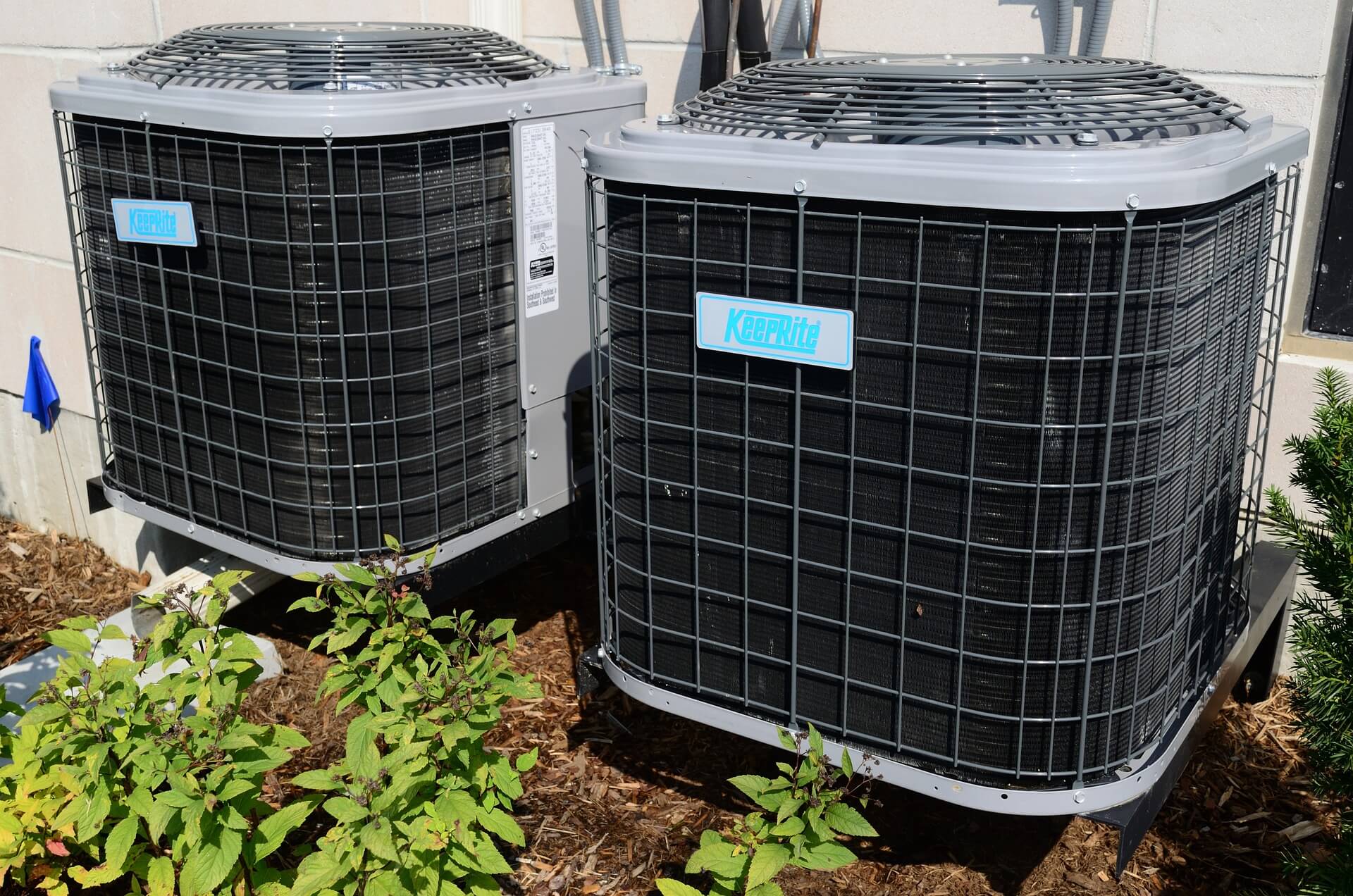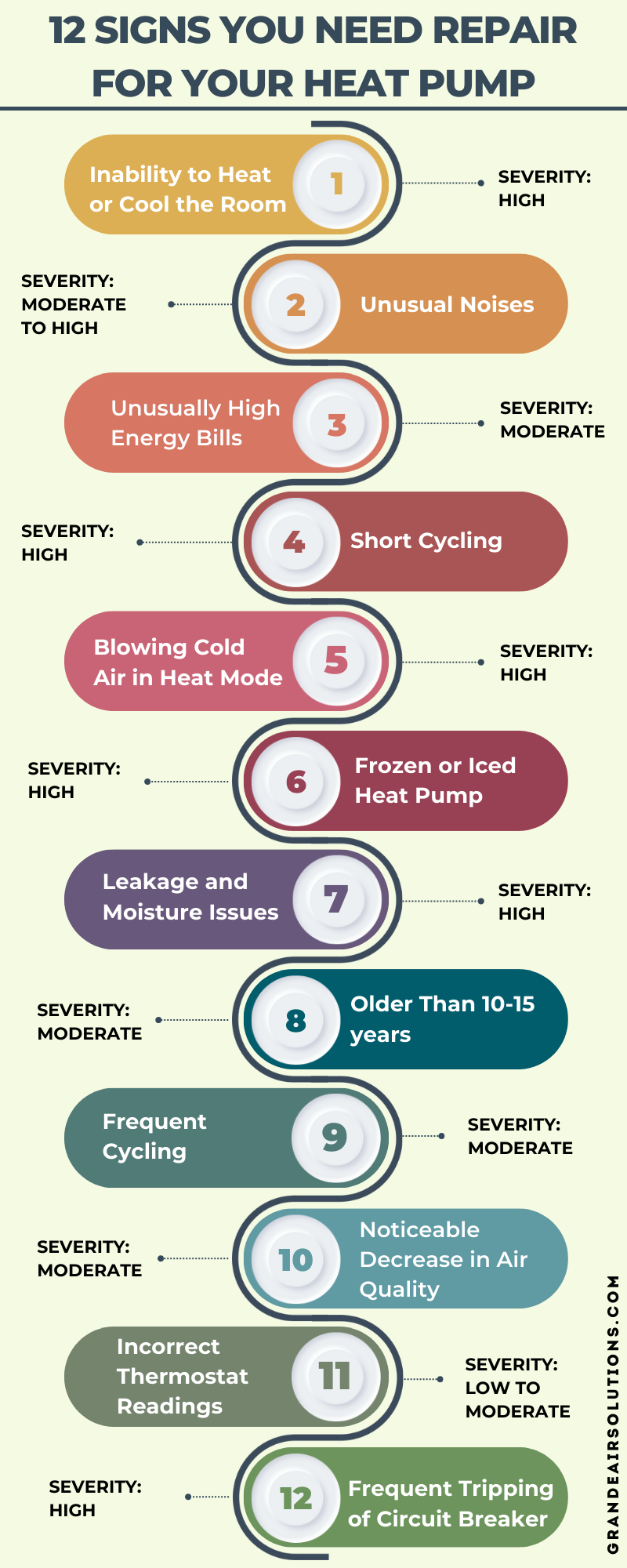
Living the Texan life isn't all BBQs and line dancing––it's also about tackling home maintenance tasks. One task that tends to sneak up on homeowners in Austin, Texas, is heat pump repair. Your heat pump works hard to keep your home at a comfortable temperature year-round, but if it's showing signs of distress, it's crucial to call the professionals.
This post is all about helping you recognize those signs so you can take action before a minor hiccup turns into a significant (and expensive) catastrophe. Look at the 12 signs that signal your heat pump might need a little TLC from a qualified repair service in Austin.

Severity: High.
The most glaring sign that your heat pump in Austin, Texas, is in dire need of repair is its inability to heat or cool your room adequately.
This issue can be particularly troublesome during those scorching summer months or the chilly winters when you need your system to work optimally.
For instance, if your thermostat is set to a cool 70°F in the summer, but it feels more like a sauna inside, it's time to call in the professionals.
Severity: Moderate to High.
Every heat pump has its rhythm, its symphony if you will. However, if you start hearing a thumping bass or a screeching violin, you might have a problem.
These unusual noises could be due to loose parts, a motor about to give up, or even a fan blade scraping against something it shouldn't.
A persistently loud or worsening noise is a cry for help from your heat pump, and it's best to arrange for a heat pump repair in Austin sooner rather than later.
Severity: Moderate.
An unexpected spike in your energy bill could be your heat pump's discreet SOS signal. This could mean your system is working overtime due to a malfunction, using more energy than necessary. According to the Energy Information Administration, heating and cooling can account for around 48% of energy usage in a U.S. home, making it the largest energy expense. If ignored, this could lead to further energy wastage and increased costs.
Severity: High.
Imagine running a marathon in sprints; that's what short cycling is for your heat pump. If your pump frequently turns on and off, it's having trouble maintaining the desired temperature. This could be due to significant issues like a refrigerant leak.
Not only does this lead to increased energy use, but it can also cause premature wear and tear on your heat pump. It's like forcing your heat pump to run a sprint marathon daily - not the best way to ensure a long and healthy life!
Severity: High.
Picture this: you're cozied up at home, expecting a warm gust of air from your heat pump, but instead, you're hit with a blast of cold air. Unsettling, isn't it? This could mean that your heat pump in Austin, Texas, is not functioning correctly. The thermostat might be misconfigured, but it is simple enough to correct. However, if the problem persists, it could indicate a more severe issue, like a refrigerant leak or a compressor malfunction. It's estimated that most of the heat pump failures in the United States are due to refrigerant leaks, making it crucial to pay attention to this sign!
Severity: High.
A bit of frost on your outdoor unit during the chilly Texas winters is normal. But if your heat pump resembles a snowman, you're in trouble. Continual freezing or icing could be a sign of refrigeration issues, fan problems, or sensor malfunctions.
Unaddressed, this could lead to permanent damage to your heat pump. So, if your heat pump looks like it's ready for a snowball fight, it's time to call for a heating repair in Austin!
Severity: High.
Notice a puddle around your heat pump? That's a red flag! Excessive leakage or moisture around the heat pump indicates a serious problem. If it's water, it could be due to a clogged condensate drain. But, if it's a refrigerant leak, it's a health hazard and an environmental concern.
The EPA (Environmental Protection Agency) has strict regulations on managing refrigerant leaks due to their detrimental effects on the ozone layer. Hence, if your heat pump is leaking, don't delay the repair!
Severity: Moderate.
Remember that old adage, "age is just a number?" Well, not when it comes to heat pumps. If your heat pump in Austin, Texas, is over a decade old, it's time to evaluate its efficiency. Older units require more frequent and extensive repairs, and sometimes, a full replacement might be more cost-effective.
Severity: Moderate
If your heat pump is acting more like a hyperactive hamster on a wheel, constantly switching on and off, you've got yourself a problem. This frequent cycling is not just a sign of your heat pump having attention span issues. It could indicate a more serious underlying problem, such as an improper calibration, an issue with the refrigerant, or even a failing compressor.
A heat pump should cycle on and off about two to three times every hour, depending on the weather. But if the cycling is increasing dramatically, it's time to call professional help for heat pump repair in Austin.
Severity: Moderate
Are you sneezing more than usual? Noticing an uptick in dust bunnies? If you're experiencing a noticeable decrease in air quality, your heat pump might be to blame. Remember, a well-functioning heat pump doesn't just heat or cool your space; it plays a vital role in filtering the air, too. When your heat pump is not filtering air effectively, it might lead to increased dust, allergens, and even bacteria in your home. The EPA reports that indoor air quality can be 2 to 5 times more polluted than outdoor air. So, if you're seeing a dust invasion, it's time to get your heat pump checked.
Severity: Low to Moderate
Have you ever looked at your thermostat and thought, "That's not right"? If your thermostat is throwing a tantrum and showing incorrect readings, this may be a sign of a problem. While it might not necessarily mean your heat pump is on the brink of a breakdown, it can lead to heating inefficiency and discomfort in your home. For instance, if your thermostat says it's a toasty 72 degrees, but you're shivering in your sweater, there's a clear disconnect. Incorrect readings can cause your heat pump to run more or less than necessary, potentially increasing your energy bills!
Severity: High
If your heat pump is frequently tripping the circuit breaker, you've got a big red flag on your hands. This indicates your heat pump is drawing more current than it should, which could be due to various serious issues such as a short circuit, motor problem, or even a wiring issue.
To put it in perspective, imagine your heat pump is a marathon runner. If it's running smoothly, it's like a well-trained athlete. But if it's tripping the breaker, that's like your marathon runner suddenly fainting mid-race. That's a clear sign of distress, and it's time for some professional heat pump repair in Austin.
Remember, regular maintenance can help catch these issues early. But, if you're seeing any of these signs, don't hesitate to call in the experts for heat pump repair in Austin. It's better to be proactive, especially when it comes to your comfort and wallet!
Your heat pump in Austin, Texas, is essentially the heart of your home. It works tirelessly to keep your living space comfortable. If it's not functioning optimally, it has to work harder to maintain the ideal temperature. For instance, if a certain component is faulty, your heat pump may run continuously, trying to reach your set temperature, but in vain.
Result? An unpleasant surprise in your energy bill! According to the U.S. Energy Department, a malfunctioning heat pump can consume 10 - 25% more energy compared to a well-maintained system. So, delaying heat pump repair in Austin can lead to skyrocketing energy bills.
Heat pumps are robust machines designed for longevity. However, continuous neglect can lead to irreversible damage. Imagine driving your car with a flat tire for months; it won't just ruin the tire but the rims, too.
Similarly, a minor issue in your heat pump, if ignored, can strain the entire system. Over time, it can lead to major damages that shorten the lifespan of your unit. Instead of a usual lifespan of 10-15 years, it might give up in just 7-8 years!
The heat pump's main purpose is to ensure your home stays comfy during scorching Austin summers and chilly winters. But, if it's not in top-notch condition, it'll fail to maintain consistent temperatures.
You might notice some rooms are too hot while others are too cold. Or, the system might take forever to reach the set temperature. Imagine wearing a sweater indoors during a Texas summer. Not a pleasant thought, right?
A malfunctioning heat pump does more than just disrupt your comfort; it can pose significant health risks, too. Specifically, if it fails to control humidity levels effectively, it can create a breeding ground for molds, dust mites, and other allergens.
Exposure to these allergens can trigger respiratory issues like asthma, especially in children and the elderly. According to the CDC, indoor molds can cause nasal stuffiness, throat irritation, coughing, and eye or skin irritation.
Remember the golden rule: "A stitch in time saves nine"? Well, it applies to your heat pump repairs, too. A minor issue today, if ignored, can snowball into a major, costly breakdown tomorrow.
For example, replacing a faulty thermostat may cost around $200-$300. But, if left unattended, it can cause the compressor to fail, which could cost you upwards of $1,000 to replace! Translation: Delaying repairs can lead to a big fat bill for heat pump repair in Austin.
For heat pump repair services in Austin, TX, Grande Air Solutions is your go-to company. We're a professional and well-reputed Heat Pump company in Austin, Texas company, with an aim to help you reduce your energy costs and achieve more efficient heating/cooling.
We provide installation, repair, and maintenance services covering all popular heat pump models and brands. Providing services for over 15 years, their A.C. repair Austin team offers 24/7 emergency HVAC repairs and guidance on choosing the right product.
Should your heat pump stop working appropriately, Grande Air Solutions ensures a smooth repair process handled by fully insured, certified, and licensed HVAC experts. For assistance, you can contact them at (512) 677-4424.
